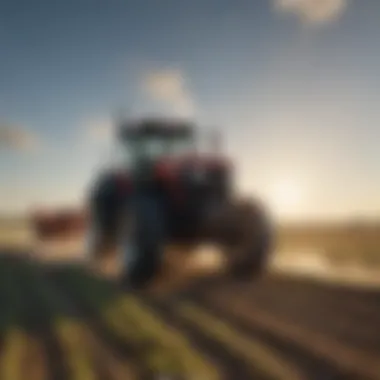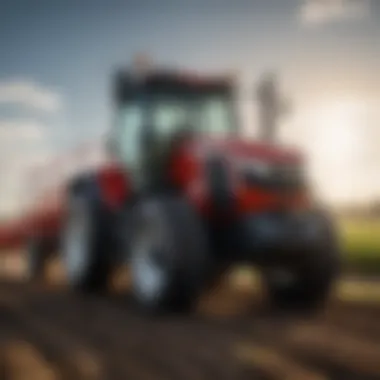The Role of Tractors in Cobb County Agriculture


Intro
Tractors have changed the game in agriculture for many decades, and their impact in Cobb County is no exception. These powerful machines are at the heart of modern farming, serving as the backbone that allows for efficient and productive agricultural practices. It's essential to take a step back and recognize not just what tractors do today but also how they have evolved to meet the demands of an ever-changing agricultural landscape.
Topic Overview
The term "tractor" typically refers to a powerful vehicle designed primarily for pulling farm implements or machinery. In Cobb County, tractors play a pivotal role not only in traditional agriculture but also in horticulture and agronomy. Their significance is multifaceted, encompassing everything from increased productivity to advancements in sustainable practices.
Definition of Key Terms
- Agriculture: The science or practice of farming, including the cultivation of crops and the rearing of animals for food, fiber, and other products.
- Horticulture: A branch of agriculture dealing with the art, science, technology, and business of growing plants.
- Agronomy: The science of soil management and crop production.
Relevance in Agriculture, Horticulture, and Agronomy
Tractors in Cobb County are not just tools; they symbolize progress. Their use in agriculture ensures that crops can be planted, tended, and harvested efficiently. In horticulture, they help cultivate flowers, fruits, and vegetables, enabling local markets to thrive. Agronomy benefits through tractors' ability to manage fields more effectively, allowing for better soil conservation and crop rotation methods. Thus, these machines are indispensable for sustainable agricultural practices and economic stability in the region.
Current Trends and Innovations
As technology evolves, so does the tractor. Cobb County farmers are integrating new advancements not just in machinery but also in the way they approach farming.
Recent Advancements in the Field
The advent of precision agriculture is transforming how tractors operate. Modern tractors come equipped with GPS technology, enabling farmers to optimize their routes and resource use. This leads to a decrease in fuel consumption and an increase in yield.
Emerging Technologies and Practices
- Autonomous Tractors: Some farmers are experimenting with fully automated tractors that require minimal human intervention.
- Data Analytics: Combining tractor technology with analytics can help in making informed decisions based on soil health, weather data, and market demands.
Practical Applications
Integrating tractors into farming practices involves more than just getting the machinery; there's a knowledge aspect that farmers need to be familiar with.
Step-by-Step Guides or How-Tos
- Assess Your Land: Understand your specific environmental factors, crop types, and soil conditions.
- Select the Right Tractor: Choose a tractor that fits your operational needs—consider factors like size, horsepower, and features.
- Implement Maintenance Regimes: Regular maintenance is key to prolonging the life of tractors and ensuring they run efficiently.
Tips and Best Practices for Implementation
- Training: Ensure that all operators are trained on the specific models in use; safety is paramount.
- Utilize Technology: Make full use of any onboard technology to maximize efficiency.
- Sustainability Practices: Engage in sustainable practices, like crop rotation and reduced tillage, in concert with the use of tractors.
Investing in tractor technology is not just a purchase; it's a long-term commitment to enhancing productivity while caring for the land.
Culmination
In exploring the impact of tractors in Cobb County, one cannot overlook their significance and versatility. These machines have transcended the simple role of pulling plows and hauling materials; they are integral to the future of agriculture, shaping how we approach farming amidst challenges such as climate change and resource management. Continuous innovations in tractor technology promise exciting developments on the horizon, making it an exhilarating time for both seasoned farmers and those new to the field.
Foreword to Cobb County Tractors
In the landscape of modern agriculture, the role of tractors in Cobb County cannot be overstated. These powerful machines have transformed farming practices, making them more efficient and effective. As we dive into this topic, it’s crucial to understand not just the tractors themselves but the broader implications they have on agricultural productivity and sustainability in the region. Tractors serve not only as a means of doing heavy lifting but also as a symbol of agricultural progress that reflects changing times and technological advancements.
Historical Context
The historical backdrop of tractor usage in Cobb County paints a vivid picture of agricultural evolution. Initially, farming in this region relied heavily on human labor and animal power, which could only do so much. The advent of tractors in the early 20th century revolutionized this approach. Tractors provided farmers the ability to plow larger fields, plant crops more efficiently, and harvest with greater speed. It marked a shift from traditional practices to mechanized methods. Farmers began to see tractors as essential to their work—which was a far cry from merely being tools of convenience.
During the post-World War II era, the adoption of tractors accelerated in Cobb County. Government programs encouraged mechanization, offering subsidies and loans that made it easier for local farmers to acquire these machines. As a result, tractor usage soared, leading to increased crop yields and diversification of farming activities.
Current Significance in Agriculture
Fast forward to today, and the significance of tractors in Cobb County's agricultural landscape continues to evolve. Modern tractors incorporate advanced technology that not only improves efficiency but also aids in sustainable practices. Precision agriculture has become a buzzword, and tractors are at the center of this movement. They are equipped with GPS and sensors, allowing farmers to monitor and manage their fields with incredible accuracy.
Moreover, the current market shows an increased focus on environmental stewardship. Many farmers are looking for ways to reduce emissions and fuel consumption—this is where tractors, with innovations like hybrid and electric engines, come into play. These advancements position tractors as valuable allies in combating climate change while meeting growing food demand.
"Tractors have reshaped not just the fields of Cobb County but also the lives of the farmers who call it home. Understanding their journey reveals much about the art and science of modern agriculture."
Cobb County's landscape, from rolling farms to bustling markets, is undeniably intertwined with the evolution of tractor technology. As we delve deeper into this exploration, we will unravel how these machines continue to influence agricultural practices and economic sustainability within the county.
Types of Tractors Utilized in Cobb County


In the world of agriculture, tractors are the beating heart, providing the muscle behind countless operations. In Cobb County, tractors serve as a pivotal tool not only for efficiency but also for the sustainability of farming practices. Understanding the different types of tractors in use allows for a greater appreciation of their role in modern agricultural methods. This section delves into the classifications of tractors found in Cobb County, categorizing them into standard and specialized variants, each with their unique advantages and considerations.
Standard Tractors
Standard tractors are the backbone of agricultural operations across Cobb County. These versatile machines are typically powered by diesel engines and come equipped with various attachments for different farming tasks. Farmers often rely on standard tractors for their durability and ease of maintenance, which can save both time and costs in the long run.
- Power and Versatility: One of the most significant advantages of standard tractors is their adaptability. They can be used for a number of tasks, from plowing fields to hauling materials. With the right attachments, they can tackle nearly any job on the farm.
- Economic Value: Standard tractors usually represent a more cost-effective option for farmers due to their broad functionality. Rather than investing in numerous specialized machines, farmers can accomplish various tasks with a single tractor.
- Operational Ease: Farmers, especially those who are newer to the field, tend to find standard tractors easier to learn and operate. With intuitive controls and widespread familiarity, these tractors often become the first choice for many local operations.
"The tractor is not just a piece of machinery, but a gateway to enhancing productivity and ensuring a sustainable future for our farmers."
Specialized Tractors
While standard tractors handle common tasks well, specialty tractors have emerged to meet the needs of specific agricultural practices within Cobb County. These machines are tailored for particular farming tasks and often come with advanced features that enhance their performance.
- Design and Functionality: Specialized tractors can include models designed for use in vineyards, orchards, or small-scale farming. Their design might feature shorter wheelbases or modified heights to navigate narrower rows or delicate crops.
- Efficiency in Niche Tasks: For farmers who grow specific crops or engage in precision agriculture, specialized tractors prove invaluable. Their ability to operate in unique settings enhances the overall efficiency of farming, enabling targeted work that can boost yield.
- Technology Integration: Many modern specialized tractors are equipped with the latest technology such as GPS and automated steering systems. This integration allows farmers to increase their precision in planting and harvesting, saving time and reducing waste.
In Cobb County, the choice between standard and specialized tractors is shaped by individual farming needs, economic considerations, and the push for innovation. Each type of tractor contributes uniquely to the landscape of local agriculture and the fabric of the community.
Technological Advancements in Tractor Design
The significance of technological advancements in tractor design cannot be overstated. As the agricultural landscape shifts, tractors evolve to accommodate changing needs. In Cobb County, tractors are not merely machines; they embody innovation that compels farmers towards higher productivity and enhanced sustainability. Modern advancements center around precision agriculture and automation, two pillars that are reshaping how farming operates today.
Precision Agriculture and Tractors
Precision agriculture represents a huge leap forward in how farmers manage their land and resources. By integrating various technologies into tractors, farmers in Cobb County can track their operations with a fine-tooth comb. These tractors are often equipped with GPS systems and sensors that gather real-time data about soil conditions, crop health, and environmental factors.
Imagine a farmer driving through a field, observing a digital display that shows specific moisture levels in the soil. The tractor can make real-time adjustments to fertilizer application, adjusting amounts on the fly based on precise requirements. This not only optimizes resource use but also minimizes waste — a win-win scenario.
Moreover, the ability to assess yield data from previous harvests allows for informed decision-making. Farmers can make predictions that guide future planting and harvesting practices. They’re not just planting seeds; they are investing time, effort, and capital into a system that yields more than just crops.
"Precision agriculture uses data to fine-tune farming practices. It’s no longer just about plowing and planting; it’s about understanding every inch of your field."
Automation and Robotics
The increasing role of automation and robotics in tractors is hard to ignore. Today’s machines can perform functions that once required human skill, often with greater efficiency and reduced safety risks. For instance, autonomous tractors are now real-life examples of how technology alleviates burdens on workers. In busy seasons, the ability to deploy a tractor without an operator onboard is nothing short of groundbreaking.
Automation allows farmers to allocate their efforts elsewhere, focusing on strategic decision-making while the machines handle the more physical tasks. Features like automated steering, seeding, and harvesting, free up human resources to focus on oversight and planning, crucial for long-term productivity.
The integration of drone technology is also worth mentioning. Drones assist in surveying land and collecting aerial data that augments the capabilities of tractors. Farmers can cross-reference this bird’s-eye view with the data from their tractors, leading to a thorough understanding of farm dynamics.
Furthermore, ongoing innovations in robotics mean that as these technologies develop, so will their applications in agriculture, creating what many are calling the next phase of farming evolution.
In summary, the bourgeoning technologies integrated into tractors in Cobb County are far from superfluous. They represent a necessary evolution, addressing the demands of modern agriculture, allowing for better resource management, and setting the stage for future advancements. The future is bright for farming, and it’s being driven quite literally by tech-savvy tractors.
The Economic Impact of Tractors in Cobb County
The economic importance of tractors in Cobb County cannot be overstated. These machines are not just tools; they are essential drivers of productivity and sustainability in modern agriculture. The impact they have on local farming practices, job opportunities, and community development is critical.
Boosting Local Agriculture
Tractors in Cobb County serve as a backbone for enhancing agricultural output. Farmers leverage these machines to increase their efficiency in planting, cultivating, and harvesting crops. For instance, instead of relying on manual labor for tilling, a tractor can till the soil in a fraction of the time. This boost in operational efficiency means that farmers can dedicate more time and resources to other vital activities, such as crop rotation and soil management.
Moreover, the use of tractors allows farmers to expand their acreage, paving the way for larger yields. With the proper technology at their fingertips, local farmers can implement precision agriculture techniques that optimize resource usage, minimize waste, and ultimately lead to higher profits. Such practices not only benefit individual farmers but also contribute to the overall prosperity of Cobb County's agricultural community.
Job Creation and Training
Tractors also play a significant role in creating job opportunities in Cobb County. The introduction of more sophisticated farming equipment necessitates skilled operators, mechanics, and support staff. This demand stimulates local employment, with many individuals seeking training and certification in machine operation.
Training programs specific to tractor operation have been developed, often in partnership with vocational schools and agricultural institutions. These programs ensure that the workforce is equipped with the necessary skills to operate and maintain modern equipment.
- Some key areas of focus in these training programs include:
- Safe operation techniques
- Basic mechanical knowledge
- Advanced features of modern tractors
Investing in education and training for tractor operation not only improves productivity on farms but also enriches community ties and promotes personal development. New industry standards call for more knowledge, and those who seek training often find a gateway into the agricultural sector, with pathways toward advancement.
"Investing in tractor training is investing in the future of Cobb County agriculture."
In summary, tractors are a linchpin in boosting local agriculture and creating job opportunities. Their economic significance continues to grow as farmers adopt innovative techniques and as communities adapt to the changing agricultural landscape.


Sustainability Practices in Tractor Usage
Sustainability in agriculture isn't just a buzzword; it's a necessity. With the growing recognition of environmental issues and the need for better resource management, tractors in Cobb County are playing a crucial role in ushering in sustainable practices. This section examines various aspects pertaining to sustainable tractor usage, emphasizing its myriad benefits and considerations.
Fuel Efficiency and Emissions
The relationship between fuel efficiency and tractor emissions cannot be overstated. By using more fuel-efficient models, farmers significantly reduce their carbon footprint while maintaining output levels.
- Innovations in Engine Technology: Recent advancements in engine design have led to tractors that consume less fuel. For instance, turbocharging and common-rail direct fuel injection are common features in modern tractors which contribute to enhanced efficiency.
- Regular Maintenance Matters: Keeping tractors in optimal condition is fundamental. Regular checks on air filters, tire pressure, and oil levels can drastically improve fuel efficiency.
- Emissions Regulations Compliance: Tractors today are often equipped with technology to regulate emissions, such as selective catalytic reduction. Adhering to these regulations not only promotes a cleaner environment but also ensures that operators stay within legal limits.
By prioritizing fuel efficiency and emission reductions, Cobb County farmers are not just complying with regulations—they're operating responsibly. This focus has led to both economic savings and improved air quality.
Integration of Renewable Energy
The integration of renewable energy into tractor operations is another leap forward in sustainable practices. This approach not only reduces reliance on fossil fuels but also fosters innovation within the sector.
- Solar-Powered Tractors: Some progressive farmers in Cobb County are exploring solar panels on their tractors. These installations harness sunlight to power components, which can lead to reduced energy costs and improved sustainability.
- Biogas Usage: Tractors can also run on biogas derived from organic waste. This circular economy approach transforms agricultural waste into usable energy, minimizing environmental impact while closing nutrient loops.
- Battery and Electric Options: The shift towards battery-powered tractors is gaining traction. Though still niche, electric and hybrid models provide a cleaner alternative. Their adoption is likely to reduce greenhouse gas emissions significantly in the long run.
Integrating renewable energy sources not only aligns with global sustainability goals but also equips Cobb County farmers with the tools to push forward into a greener agricultural future.
"Sustainability should not be an afterthought in agriculture; it should be woven into every practice and decision we make."
In summary, the commitment to sustainability in tractor usage within Cobb County is not a mere choice, but a pivotal shift towards responsible agriculture. By advancing fuel efficiency and embracing renewable energy, agricultural practices here are aligning with a larger worldwide movement towards environmental stewardship. The future for sustainable agriculture is bright, with tractors leading the charge.
Tractor Maintenance and Safety Protocols
Maintaining tractors and ensuring safety protocols are non-negotiable in modern agriculture. Cobb County farmers face numerous challenges, and proper care of their tractors is not just a matter of performance but also of safety and reliability. Regular maintenance can lead to a longer lifespan for these vital machines while minimizing the risk of accidents on the field.
Routine Maintenance Practices
Routine maintenance is vital for keeping tractors running smoothly and efficiently. Here’s what that typically involves:
- Regular Oil Changes: Just like any engine, tractors require fresh oil to lubricate parts and reduce friction. Not doing so can increase wear and tear.
- Checking Fluid Levels: Coolant, brake fluid, hydraulic fluid—these must all be checked regularly. Low levels can cause significant problems leading to breakdowns.
- Tire Inspections: Tractors often traverse uneven terrains. Hence, checking tire pressure and tread depth ensures optimal traction and fuel efficiency.
- Cleaning Air and Fuel Filters: Dirty filters can hinder performance. Keeping them clean leads to better efficiency and fuel economy, which is key in the long run.
"Proper maintenance today can save headaches tomorrow. Taking time to care for equipment pays off in productivity and safety."
In Cobb County, local agriculture extends far beyond simple platitudes. Farmers know that their tractors are the backbone of their operations. Neglecting maintenance can have dire consequences, such as costly repairs or worse—a halted harvest during prime farming season.
Ensuring Operator Safety
Safety in agriculture is paramount. Tractors are heavy machines that can pose risks if not operated correctly. Here are several key safety protocols that should always be followed:
- Training: Operators must undergo proper training to understand the machine's controls and safe operation practices.
- Wearing Seatbelts: Many modern tractors come equipped with rollover protection structures (ROPs), but these are only effective if the operator is buckled in.
- Inspections Before Use: Conduct thorough inspections before engaging in any work. Look for issues such as leaks, worn-out parts, and malfunctioning lights.
- Awareness of Surroundings: Always be aware of your surroundings—fields can be busy with other machinery, livestock, or people.
As agriculture flourishes in Cobb County, the safety of the operators remains critical. Every precaution taken contributes not just to the individuals involved but also to the success of the entire agricultural community.
Case Studies: Successful Tractor Implementation
Case studies play a vital role in understanding the practical aspects of tractor use in Cobb County's agriculture. These real-world examples help to illuminate how farm operations have evolved through the effective integration of tractor technology, revealing both the benefits and challenges experienced by local farmers. The focus on case studies provides insights into best practices, innovative strategies, and the tangible outcomes that come from successfully implementing machinery into agricultural routines. This section aims to share compelling narratives that reflect the multifaceted impacts of tractors in modern farming.
Local Farms Transforming Practices
Numerous farms throughout Cobb County have embraced tractors as a core component of their agricultural practices. A notable example is Green Pastures Farm, which has transitioned from traditional plowing methods to more sophisticated techniques using modern tractors.
Unlike before, where farmers relied heavily on manual labor and outdated equipment, Green Pastures has streamlined its planting and harvesting processes. This shift has not only increased efficiency but also significantly reduced the time and labor costs typically involved in running a farm. By incorporating GPS technology in their tractor systems, the farm has achieved precise planting, leading to improved crop yields.
Another inspiring instance is Hillside Orchards, where drone technology and tractors work in harmony. With tractors fitted with advanced sensors, the farm can monitor soil health and moisture levels, helping to optimize irrigation schedules. This integration has not only improved the quality of the fruit but also ensures that resource consumption aligns with sustainability goals. Farming methods like these highlight the importance of tractors in adapting to both market demands and agricultural challenges.
Collaboration with Agricultural Research Institutions
Collaboration between local farms and agricultural research institutions has been invaluable in driving innovative tractor usage. For instance, Cobb County farmers have partnered with Auburn University’s agriculture department to explore enhanced tractor technologies.
These partnerships often result in trials that test various machinery enhancements, like automated steering systems or improved implements that increase soil productivity. The research findings are often quickly adopted by local farmers, ensuring that the community stays abreast of technological advancements. Such collaborations also foster an environment focused on continuous learning and adaptation—hallmarks of modern agriculture.
Furthermore, through these academic partnerships, farmers receive training and insights around new machinery, including safety protocols and maintenance practices. Ultimately, the relationship between local farms and agricultural institutions not only enhances tractor efficiency but also boosts farmers’ capabilities, enabling them to meet the demands of a rapidly changing agricultural landscape.
"Innovation isn’t only about technology; it’s about the ability to adapt and evolve continuously in the face of challenges."


In essence, case studies from Cobb County provide a rich tapestry of knowledge, illustrating the transformative power of tractors in agriculture. By analyzing local successes and collaborative efforts, farmers and enthusiasts alike can draw valuable lessons that inform future practices.
Challenges Facing Cobb County Tractors
Cobb County's agricultural landscape, while thriving, does not lack its fair share of hurdles. The intersection of market dynamics, consumer expectations, and regulatory frameworks creates a complex web of challenges for tractor operations in the area. Addressing these challenges is crucial for farmers who rely on tractors not just as tools, but as essential partners in cultivating the land.
Market Fluctuations and Consumer Demand
The agricultural economy is fraught with ups and downs, notably due to market fluctuations. Farmers in Cobb County often face situations where they must navigate the unpredictable tides of supply and demand. Recent years have seen changes in consumer preferences that can impact what crops are viable to cultivate and deliver to local markets. For instance, the rising popularity of organic produce may push farmers to shift from traditional crops to organic ones, thus impacting the type or even the design of tractors they need.
"Whether it’s corn or carrots, it all comes down to what the folks in town are willing to buy."
This shift means that those tractors that were once all-purpose may need to be equipped with specialized attachments to accommodate new farming practices or crop types. Those decisions often hinge on consumer trends, which can be fickle and heavily dependent on outside factors, such as health trends or economic downturns. Consequently, farmers find themselves needing to adapt quickly or risk falling behind the curve.
In dealing with these market changes, a forward-thinking approach can help mitigate risks. Many farmers are now using data analytics to better forecast market trends. By anticipating the needs of consumers, they can make more informed decisions regarding equipment and crop selection, ensuring they stay ahead of the curve.
Regulatory Considerations
Navigating regulatory considerations can also be a minefield for Cobb County farmers. Tractors are subject to a myriad of regulations ranging from safety standards to emissions guidelines. Each state may impose different requirements, and it can sometimes feel like farmers are juggling flaming torches on a windy day. For instance, environmental regulations are increasingly stringent, pushing tractors to adopt greener technologies or risk facing penalties.
Farmers must not only invest in tractors that meet these standards but also consider potential upgrades that may not yield immediate returns. The challenge lies in finding a balance between compliance, sustainability, and economic viability.
- Understanding state mandates and federal laws is crucial.
- Participating in farmers’ associations can provide valuable insights into upcoming regulatory changes.
- Networking with other tractor users can also offer practical solutions to common issues.
In summary, the complexities surrounding market dynamics and regulatory environments present both challenges and opportunities for Cobb County tractor users. Awareness and adaptability are key. As farmers become more attuned to these elements, they can leverage their experiences to create a more resilient and prosperous agricultural future.
Future Trends in Tractor Technology
The landscape of modern agriculture is witnessing a remarkable transformation, spurred on by advancements in tractor technology. As Cobb County farmers strive to improve efficiency while adhering to sustainable practices, the notion of future trends in tractor technology emerges as not just an innovative concept but a necessity. It encapsulates a variety of elements that aim to enhance agricultural output, reduce environmental footprints, and adapt to the ever-evolving demands of the market. With increasing global population, farmers must optimize their operations, and tractors will be central to this progression.
Electric and Hybrid Tractors
Electric and hybrid tractors are beginning to take center stage in Cobb County's agricultural arena. These machines promise benefits that were mere whispers a decade ago. Reduced fuel costs, lower emissions, and less overall maintenance are enhancing their allure. For instance, the Fendt e100 Vario, an electric model, is quietly making waves with its near-silent operation and eco-friendly performance.
Consider the following advantages of adopting electric and hybrid tractors:
- Cost-Effectiveness: Lower fuel consumption and cheaper electricity make these tractors a more cost-effective option in the long run.
- Environmental Impact: The shift to electric reduces reliance on fossil fuels and minimizes greenhouse gas emissions, aligning with sustainability goals.
- Operational Flexibility: Built with advanced battery technology, these tractors can be recharged during off-peak hours, offering flexibility in operation.
However, transitioning to electric and hybrid models comes with challenges. Infrastructure for charging stations is still developing, making it a potentially tricky landscape for some farmers. The upfront cost of these tractors could also be dissuasive.
Emerging Technologies and Their Impacts
The horizon is also brightening with the advent of emerging technologies that promise to revolutionize tractor efficiency even further. Drones, precision agriculture tools, and telematics are weaving a tapestry of connectivity that enhances the capabilities of tractors.
For example, drones can survey large fields swiftly, providing real-time data to farmers and enabling informed decision-making. Precision agriculture tools can analyze soil health and crop conditions, allowing tractors to apply resources only where needed, thus avoiding wastage. This is more important than just saving time; it shapes the quality and yield of the crops.
In terms of telematics, integrating GPS and data analytics systems in tractors enhances fleet management. It allows for optimized routes, fuel efficiency, and maintenance scheduling. As a result, farmers can expect:
- Increased Precision: More accurate input application leads to healthier crops.
- Cost Savings: Enhanced efficiency translates to reduced operational costs.
- Data-Driven Decisions: Farmers gain insights from data analytics, enabling better strategy formulation.
Ultimately, as these technologies permeate the market, Cobb County’s agriculture is set for a leap forward. The integration of electric tractors and emerging technologies signifies not just an improvement in machinery but an altogether refined farming methodology that favorably positions the county in the agricultural continuum.
"The future of farming lies in sustainable technology that marries innovation with responsibility."
Ending: A Look Ahead for Cobb County Agriculture
As the agriculture landscape continues to evolve, looking ahead to the future of Cobb County's farming practices is both crucial and inspiring. The integration of tractors into everyday operations in this region has already showcased their immense value, not only enhancing productivity but also transforming the way work gets done. This section aims to address the potentials and considerations facing local agriculture, focusing specifically on how innovation and collaboration hold the keys to a successful future.
The Path Forward
To effectively move forward, Cobb County must consider several strategic elements. First and foremost is the engagement with emerging technologies. Farmers should be aware of the rapidly growing trends in electric and hybrid tractors, which offer not only lower emissions but also reduced fuel costs over time. The knowledge of precision agriculture, equipped with data analytics tools, will allow farmers to tailor their approaches based on actual conditions in their fields, optimizing yields in ways that were previously inconceivable.
Moreover, training programs designed to familiarize operators with new technology is essential. As equipment becomes more sophisticated, ensuring that operators are both capable and confident is pivotal. Local institutions can play a fundamental role here, bridging the gap between modern technology and the workforce requirements.
Continued Innovation and Collaboration
In addition to technological uplift, the spirit of collaboration among local farmers, research institutions, and tech companies can act as a catalyst for continuous improvement. Local innovation hubs can foster an environment where ideas are shared, leading to community-supported solutions tailored specifically for the unique challenges faced in Cobb County. Engage in regional agricultural fairs or local forums to discuss advancements and share experiences with fellow farmers.
A key aspect to foster innovation is seeking partnerships with universities and agricultural research organizations. These collaborations can lead to research-based recommendations that farmers can implement practically in the field. Moreover, such relationships provide invaluable access to funding opportunities, grants, and educational resources that could prove indispensable.
"The future of farming is intertwined with technology and collaboration; we must step boldly into this new era."
Finally, as the market evolves, adaptability will be essential. By remaining vigilant about changing consumer demands and market fluctuations, farmers can be proactive rather than reactive. Regularly assessing market trends will enable them to understand better the products that consumers are desiring, ensuring that Cobb County Agriculture remains not just relevant, but a leader in sustainable and efficient farming practices.
By concentrating on these elements, Cobb County's agricultural community can confidently traverse towards a future filled with possibilities, ensuring that both the land and the communities that depend on it thrive.



